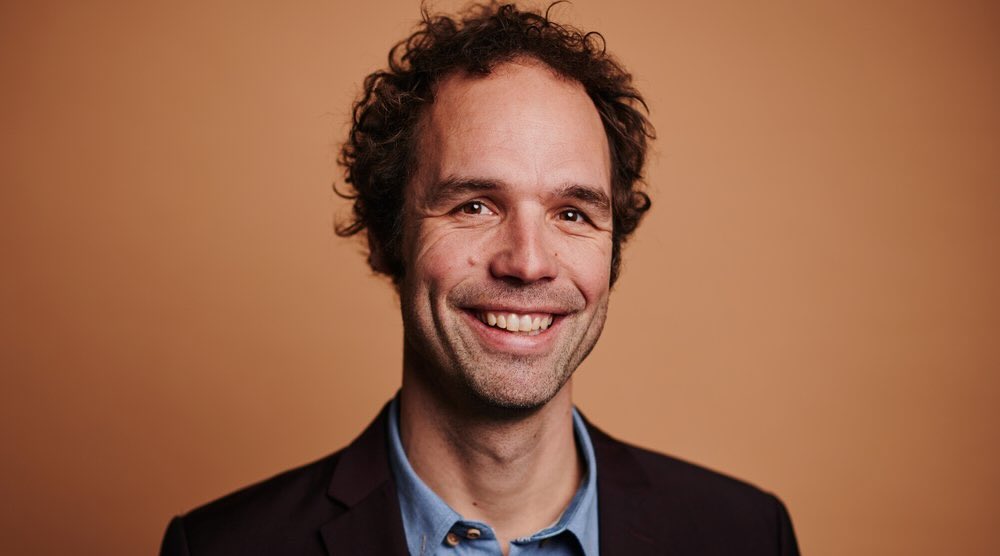


To help conference participants better understand one another, behavioral expert Thimon de Jong has audience participants team up and ask each other this question: How do you see the future?
Talking about the multiple crises that the world faces — a “polycrisis” of war, political polarization, the global decline in mental health, climate change, and more — is a part of almost every keynote he presents, said behavioral expert and Convening EMEA Main Stage speaker Thimon de Jong. That’s because, he told Convene, “we need to address it” — despite how some clients he works with may resist the topic. “They say, ‘No, no, please, we want something optimistic. We get so much [about] crisis these days.’” But the state of the world affects how we behave and make decisions and cannot be ignored, said de Jong, author of Future Human Behavior: Understanding What People Are Going to Do Next, and founder of Whetston, an Amsterdam-based think tank that applies the insights of futurists and behavioral research to leadership training.
For de Jong, addressing the polycrisis in his talks at conferences requires adding an important interactive layer — if you just point to all the crises that are going on, “you leave people in an awful state,” he said. “So I talk about some difficult topics but give people some practical tools for how they can respond.”
One of his favorite exercises is meant to help participants understand how others, particularly from different generations, think and feel about the future. “There’s very much a disconnect between the older and the younger generations — in society, at work, in a conference room — when you talk about the future,” said de Jong , who came of age in the 1990s, which he defines as “the most optimistic, positive decade of the last 50 years.” Many over 35 retain that outlook because they’ve seen many crises come to an end, he added. “We’ve seen the end of the Cold War, the Rwanda genocide, and the Yugoslav Wars in Europe,” he said. “We saw the Chernobyl nuclear plant disaster come to an end.”
But for many younger people, “the future is a very scary place — loaded with negativity and fear. The polycrisis has a devastating effect on them,” he said. Meanwhile, those who are older say, “Aw, come on, get yourselves together. Be more resilient — you’re a bunch of snowflakes,” he said. “And that’s not working.”
To help conference participants better understand one another, de Jong has audience participants team up and ask each other this question: How do you see the future? “If you do this with a group of different ages, different ethnicities, and cultural backgrounds, you get a very different range of answers,” he said.
In a second exercise, people ask one another: What do you do to give yourself some mental energy in these crazy polycrisis times? This discussion always results in “an explosion of noise. It’s actually hard for me to quiet people down,” so he can get back to the keynote, de Jong said. Audiences embrace it because it’s an easy way for them to talk about their mental health, he said. The phrase “mental health” has a bit of a negative connotation, especially for older males, he said. “I hear from people my age” — de Jong is 47 — “that mental health is a scary thing,” he said. “Gen Z and their HR colleagues are saying that we should do something about mental health and it’s a bit scary. But if you give people a little bit of control over topic like mental health, that’s very empowering.”
The volume also goes up during those conversations, de Jong said, because there is such a strong desire for people to interact. One reason why: the post-pandemic rise of remote work, which he calls “a disaster for building relationships.” Relationship building requires building trust, which is hard to do and takes a lot longer when collaborating or meeting remotely, he said. “Some things you’re just missing in a digital environment.”
All things considered, de Jong is more optimistic than he was a decade ago, he said, when he was pessimistic about the short-term future. “Things have to get worse before they get better” — and they have gotten worse, he said. “So I’m actually quite optimistic for the 2030s.” And given the strong need for people to get together in person, he offers a bright spot: “I think that the golden era for conference organizers is upon us.”
Barbara Palmer is Convene’s deputy editor.
Convening EMEA 2025 participants will experience de Jong’s interactive approach to presenting keynotes during his talk, “Mapping the Dots: A Journey Through Trust, Empathy, and Mental Health in an Over-Connected World,” on Oct. 15 in Rotterdam, the Netherlands.








